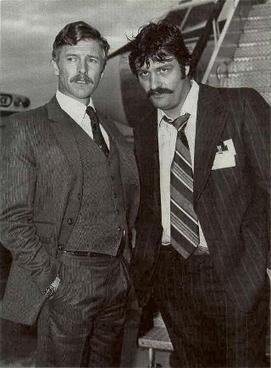Timothy Burstall AM was an English Australian film director, writer and producer, best known for hit Australian movie Alvin Purple (1973) and its sequel Alvin Rides Again (1974).
This is a list of Australian television-related events in 1976.

Alvin Purple is a 1973 Australian sex comedy film starring Graeme Blundell in the title role; the screenplay was written by Alan Hopgood and directed by Tim Burstall, through his production company Hexagon Productions and Village Roadshow.

Skyways is an Australian television soap opera drama series made by Crawford Productions for the Seven Network.
Sue Belinda Giblin professionally billed as Belinda Giblin, is an Australian actress. Prominent in theatre and television soap operas, and several feature films.
Judy Lynne, credited also as Judy Lind is an American-born Australian former actress.
Glen Street Theatre is a 400-seat proscenium arch auditorium located in the Forest Community Centre, at the corner of Glen Street and Blackbutts Road in Belrose in the northern suburbs of Sydney, New South Wales, Australia. It was opened as Stage 2 of the Forest Community Centre on 6 July 1985 by Warringah Shire President Darren Jones, and is owned by the Northern Beaches Council.
Good Guys, Bad Guys is an Australian comedy/drama TV series that screened on the Nine Network between 1997 and 1998, with a telemovie and twenty-six episodes produced. The crime-themed show was set in Melbourne.
Chantal Contouri, sometimes credited as Chantal Cantouri, is a Greek Australian television and film actress. She has acted in many films and TV series as well as on stage, with one of her best known roles being in the 1970s soap opera Number 96 as nurse Tracy Wilson.
Alvin Rides Again is a 1974 Australian sex-comedy film sequel to Alvin Purple. It was directed by David Bilcock and Robin Copping, who were regular collaborators with Tim Burstall. It was rated M unlike its predecessor which was rated R. Alvin Rides Again still features a lot of full frontal nudity.
Judith Ann Morris is an Australian character actress, as well as a film director and screenwriter, well known for the variety of roles she played in 58 different television shows and films, starting her career as a child actress and appearing on screen until 1999, since then she has worked on film writing and directing, most recently for co-writing and co-directing a musical epic about the life of penguins in Antarctica which became Happy Feet, Australia's largest animated film project to date.
Petersen is a 1974 Australian drama film directed by Tim Burstall.
Stork is a 1971 Australian comedy film directed by Tim Burstall. Stork is based on the play The Coming of Stork by David Williamson. Bruce Spence and Jacki Weaver make their feature film debuts in Stork, being honoured at the 1972 Australian Film Institute Awards, where they shared the acting prize. Stork won the prize for best narrative feature and Tim Burstall won for best direction. Stork was one of the first ocker comedies. Stork was the first commercial success of the Australian cinema revival called the Australian New Wave.
2000 Weeks is a 1969 Australian drama film directed by Tim Burstall and starring Mark McManus, Jeanie Drynan, and Eileen Chapman.

Jacqueline Ruth Weaver is an Australian theatre, film, and television actress. Weaver emerged in the 1970s Australian New Wave through her work in Ozploitation films such as Stork (1971) for which she won AACTA Award for Best Actress in a Leading Role, Alvin Purple (1973), and Petersen (1974). She later starred in Picnic at Hanging Rock (1975), Caddie (1976) for which she won the AACTA Award for Best Supporting Actress in Film, Squizzy Taylor (1982), and a number of television films, miniseries, and Australian productions of plays such as Death of a Salesman and A Streetcar Named Desire.
Shannon's Mob is an Australian TV series about an Australian intelligence agency. It was the last TV series from Fauna Productions, who were responsible for Skippy the Bush Kangaroo among others.
Water Under the Bridge is a 1980 miniseries based on the 1977 novel by Sumner Locke Elliott.
Quality of Mercy is a 1975 Australian TV series, which took the format of an anthology of television plays. All the scripts were by female writers. The series was commissioned by John Croyston, the head of ABC TV Drama, and was produced in Melbourne and Sydney. It was followed later in 1975 by a companion series, The Seven Ages of Man.
The Comedy Game is an Australian television comedy anthology series that aired in 1971 and 1973 on ABC. The new comedies screened in the series were seen as possible pilots for a full television series.
The Removalists is a 1975 Australian film based on the play of the same name.